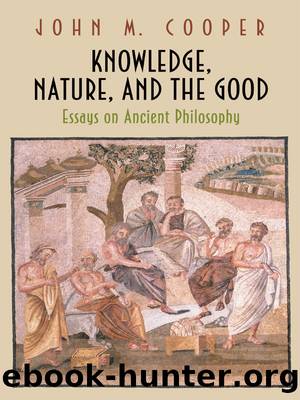Knowledge, Nature, and the Good by Cooper John M.;Cooper John M. M.;

Author:Cooper, John M.;Cooper, John M. M.; [Cooper, John M.;Cooper, John M. M.;]
Language: eng
Format: epub
ISBN: 9781400826445
Publisher: Princeton UP
Published: 2008-09-15T05:00:00+00:00
CHAPTER 9
STOIC AUTONOMY
AS IT IS CURRENTLY UNDERSTOOD, the notion of autonomy, both as something belonging to human beings and human nature, as such, and also as the source or basis of morality (moral duty), is bound up inextricably with the philosophy of Kant. The term âautonomyâ itself derives from classical Greek, where (at least in surviving texts) it was applied primarily if not exclusively in a political context, namely, to certain civic communities possessing independent legislative and self-governing authority.1 The term was taken up again in Renaissance and early modern times with similar political applications, but was applied also in ecclesiasti- cal disputes about the independence of reformed churches from the former authority of the church of the Roman popes.2 Kantâs innovation consisted in conceiving of (finite) individual rational persons, as such, as law givers or legislators to themselves, and to all rational beings (or rather to all that are not perfect and holy wills), for their individual modes of behavior. For Kant, rational beings possess a power of legislating for themselves individually, according to which they each set their own personal ends and subject that selection, and their pursuit of the ends in question, to a universal principle, expressed in Kantâs categorical imperative. The categorical imperative requires that one set oneâs own ends only within a framework that would warrant acceptance of them by all other such beings. For Kant, autonomy accompanies individual rationality, and has nothing to do with the political (or other organizational) circumstances of any specific community of agents, even though it understandably gave rise to his conception of a âkingdomâ or ârealmâ of ends in which each (fully) rational end setter would cooperate with, and support, all other end setters in a harmonious pursuit by all of their individual self-set ends, under the umbrella of the commonly legislated categorical imperative.
Without making any reference to possible influences of Stoic ideas upon Kantâthat would be beyond my competence, and would anyhow be work for a subsequent studyâI shall explore here what I think are related, but interestingly different, ideas in ancient Stoicism.
I
In speaking of ancient Stoicism I have primarily in mind the work of the original Stoics of the third century B.C., and especially that of the great philosopher Chrysippus. However, in order to introduce the themes I want to discuss, I begin by citing a fascinating and, in this context, apparently overlooked oration of the late first-century A.D. popular philosopher, Dio of Prusa (also called Dio Chrysostom, âof the golden mouth,â in recognition of his powerfully inspiring speechifying). Dio was not strictly a Stoic philosopher (he apparently did not teach or hold forth in any âschoolâ), but he did study at Rome with the important Roman Stoic, Musonius Rufus (who taught in Greek, and who had among his other pupils Epictetus). During the middle decades of his life Dio was a wandering orator, in forced exile from both Rome and his home in Bithynia, in northwest Asia Minor. He was a popular proponent of salvation through âthe philosophical life.
Download
This site does not store any files on its server. We only index and link to content provided by other sites. Please contact the content providers to delete copyright contents if any and email us, we'll remove relevant links or contents immediately.
The remains of the day by Kazuo Ishiguro(8403)
Tools of Titans by Timothy Ferriss(7824)
Giovanni's Room by James Baldwin(6818)
The Black Swan by Nassim Nicholas Taleb(6775)
Inner Engineering: A Yogi's Guide to Joy by Sadhguru(6446)
The Way of Zen by Alan W. Watts(6292)
Asking the Right Questions: A Guide to Critical Thinking by M. Neil Browne & Stuart M. Keeley(5360)
The Power of Now: A Guide to Spiritual Enlightenment by Eckhart Tolle(5345)
The Six Wives Of Henry VIII (WOMEN IN HISTORY) by Fraser Antonia(5241)
Astrophysics for People in a Hurry by Neil DeGrasse Tyson(5004)
12 Rules for Life by Jordan B. Peterson(4166)
Housekeeping by Marilynne Robinson(4070)
The Ethical Slut by Janet W. Hardy(4042)
Skin in the Game by Nassim Nicholas Taleb(3973)
Double Down (Diary of a Wimpy Kid Book 11) by Jeff Kinney(3934)
Ikigai by Héctor García & Francesc Miralles(3900)
The Art of Happiness by The Dalai Lama(3851)
Skin in the Game: Hidden Asymmetries in Daily Life by Nassim Nicholas Taleb(3731)
Walking by Henry David Thoreau(3685)
